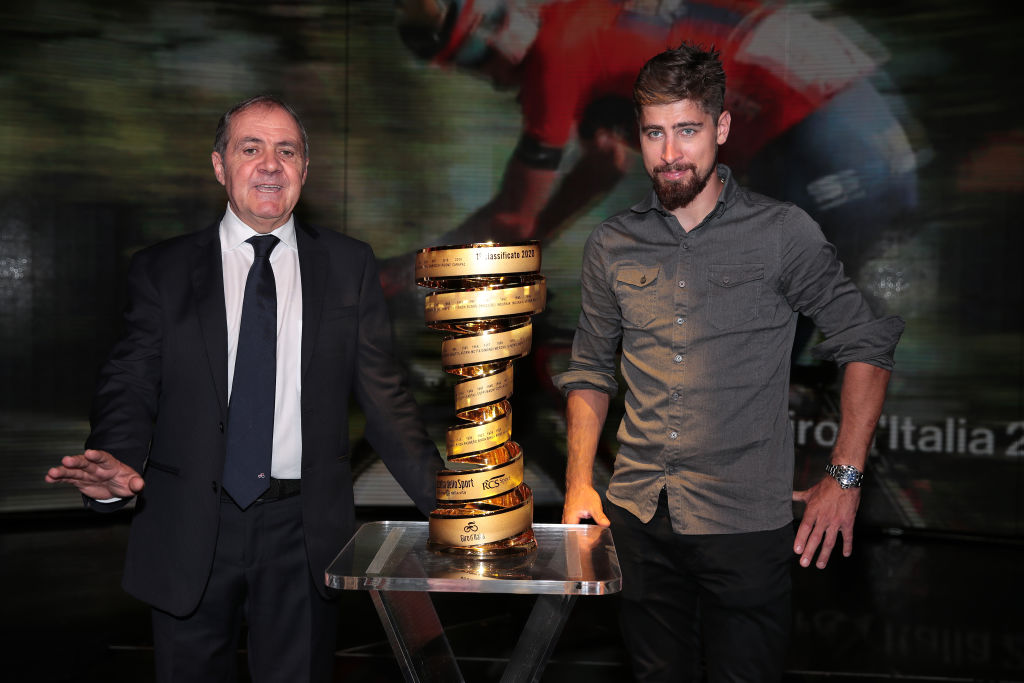Vegni has concerns for coronavirus impact on Giro d'Italia after Paris-Roubaix cancellation
'I’m worried because we still have two weeks of the Giro left' says race director

The cancellation of Paris-Roubaix due to the COVID-19 pandemic means that ‘Super Sunday’ is no more, but for Mauro Vegni, October 25 is all about bringing his rescheduled Giro d’Italia safely to its planned conclusion in Milan.
Speaking on RAI’s Processo alla Tappa programme after the finish of stage 7 in Brindisi, the race director admitted there were concerns for the Giro due to the rising numbers of reported COVID-19 coronavirus cases in Italy in recent days.
ASO confirmed on Friday morning that Paris-Roubaix would be cancelled after the Lille Metropolitan area was placed on maximum alert due to the rising number of coronavirus cases in that area.
“I think that if we ended up in a situation like that ourselves, there would be little we could do. If the national authorities decided something, we would have to abide by their decree,” Vegni said.
“Today we had confirmation of the cancellation of Paris-Roubaix. I’m very sorry about that, because we’re losing one of the most important Classics in cycling, comparable maybe only with Milan-San Remo. It’s a pity," Vengi said. "And, above all, the situation worries me because it means that the level of contagion is rising, and we still have two weeks of the Giro to go.”
Although Italy has been more successful than many of its neighbours in curbing the spread of the coronavirus since the summer, the level of contagion has crept up in recent weeks. On Thursday, there were 4,458 new cases of COVID-19 reported in Italy, the highest daily number since the country was in lockdown in April. Earlier this week, the Italian government extended the country’s state of emergency until January 31, while on Thursday, it became mandatory to wear face masks outdoors.
The cancellation of the men’s and women’s editions of Paris-Roubaix means that just two WorldTour races remain scheduled for October 25 – the concluding time trial of the Giro and stage 6 of the Vuelta a España, which finishes atop the Col du Tourmalet. Asked if he felt the Vuelta was at risk after a 15-day state of emergency was enacted in Madrid, Vegni preferred to focus on his own event.
Get The Leadout Newsletter
The latest race content, interviews, features, reviews and expert buying guides, direct to your inbox!
“Cycling lives by the public it attracts, but unfortunately, crowds also increase the risk of contagion,” Vegni said. “I don’t know the conditions in Spain, but from what I’ve heard, they’re on alert in recent days, something that fortunately isn’t yet the case in Italy. But like I said earlier, I’m worried that we still have two weeks to go.”
Vegni confirmed that the riders and team staff on the 2020 Giro will undergo their next round of COVID-19 testing on Sunday and Monday, while the race organisation will be tested again on Wednesday. Before the Giro, Vegni announced that RCS Sport would not impose the same "two strikes, team out" rule on coronavirus testing that was in force at the Tour de France.
“We’re trying to maintain a bubble as much as possible around the athletes,” said Vegni, who called on spectators and race followers to uphold the physical distancing measures in place in Italy. “Let’s keep our distance, keep wearing masks and overcome this moment of crisis.”
Earlier in the day, Vegni had expressed confidence that the Giro would not be unduly disrupted by foul weather when it reaches the high mountains in the third week. As when the race is run in May, the Giro already has possible alternative itineraries prepared for mountain stages that might be affected by snow.
“We have two topics of concern: COVID-19 and the third week,” Vegni told RAI. “For the first, we can do nothing but stay vigilant and continue to respect all the protocols that have been defined. The third week is a problem that isn’t a problem at the moment, because we’ve already studied all the solutions necessary to bring the Giro d’Italia to a successful conclusion without distorting its character.”

Barry Ryan was Head of Features at Cyclingnews. He has covered professional cycling since 2010, reporting from the Tour de France, Giro d’Italia and events from Argentina to Japan. His writing has appeared in The Independent, Procycling and Cycling Plus. He is the author of The Ascent: Sean Kelly, Stephen Roche and the Rise of Irish Cycling’s Golden Generation, published by Gill Books.